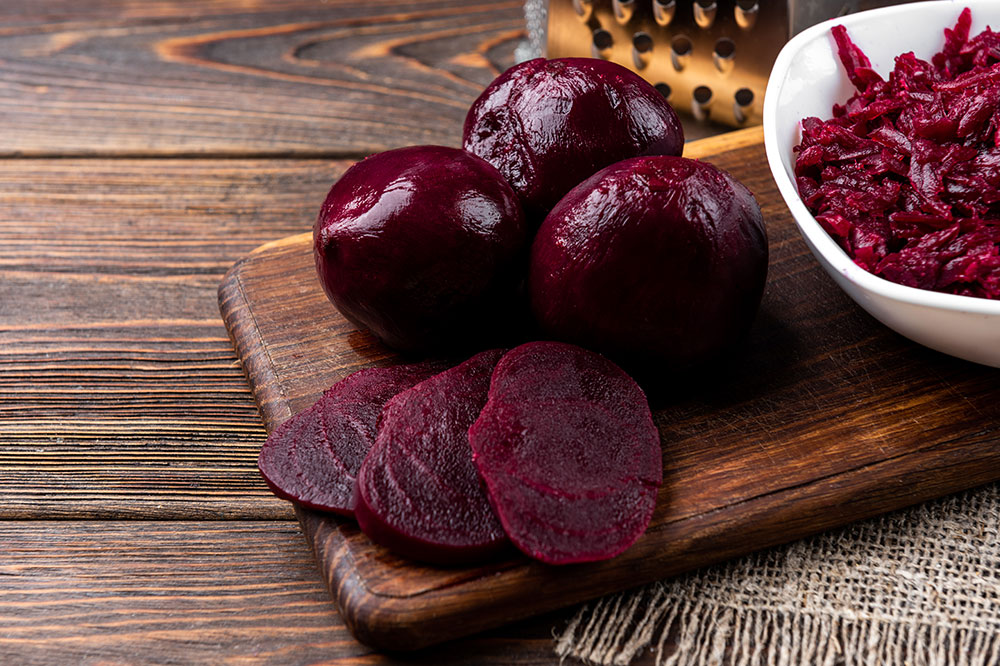12 Foods That Can Help Prevent Lung Diseases

The lungs perform several vital functions, such as oxygenating the blood to maintain the functioning of other organs in the body. But the lungs might be susceptible to disease or infection due to genetic and environmental factors. When at risk of lung diseases like cancer, doctors prescribe treatments and certain lifestyle changes, such as making better food choices to improve lung health and prevent diseases. So, here are the best foods for improving lung health:
Beetroot
Adding beetroot to meals is one of the best ways to improve lung health. The colored roots and greens of the beet plant contain compounds such as nitrates, which can help relax the blood vessels, improve oxygen uptake, and reduce blood pressure. Further, the nutrients in beetroots may also help improve lung function in those with health conditions like COPD and pulmonary hypertension—a type of high blood pressure.
Apples
The lungs are susceptible to oxidative stress, which may result in inflammation of the airways. Apples are rich in antioxidants, including vitamin C and the flavonoid quercetin, which could reduce such stress and improve lung function. Eating apples has also been associated with a lower risk of asthma. Five or more apples per week can also help reduce the risk of developing COPD.
Dark chocolate
A bar of dark chocolate can improve lung health as it contains cocoa, which is rich in flavonoids that act as antioxidants. Chocolate also contains theobromine, a compound known to relax the airways in the lungs. Cocoa or cacao products like dark chocolate can also help reduce the risk of allergic respiratory symptoms and protect the body against lung cancer.
Pumpkin
The colored flesh of the pumpkin is rich in compounds called carotenoids, like beta carotene, zeaxanthin, and lutein. These compounds exhibit anti-inflammatory properties and antioxidants, so a healthy dose of carotenoids can improve lung function. Further, research suggests that higher levels of carotenoids in the blood may contribute to better lung health.
Turmeric
The spice has been used for centuries to tackle various health complications. Turmeric contains potent antioxidant and anti-inflammatory properties, mainly in its compound called curcumin, which can improve the quality of the lungs. The compound is also believed to reduce inflammation in the airways and protect the lungs from damage caused by pollution and other environmental damage. One could add turmeric to a range of recipes to make the most of its health benefits.
Tomatoes
Those who eat tomatoes regularly may experience a slower lung function decline, especially when dealing with conditions such as asthma. Introducing the vegetable or its by-products to daily meals could also help nourish the body with lycopene, an antioxidant associated with better lung function. Products like tomato puree may also help reduce inflammation in the airways and help manage lung function in those with COPD.
Blueberries
Blueberries are not just delicious but also healthy. The fruit is rich in nutrients essential for improving overall health, including protecting the lungs. The berry is a rich source of anthocyanins, such as malvidin, peonidin, cyanidin, petunidin, and delphinidin, which can protect the lung tissue from oxidative damage. One could also add other berries to their meals, such as blackberries and strawberries, which also help improve lung health. One could have them as snacks or blend them with other healthy ingredients to make a delicious smoothie.
Green tea
Green tea is a herbal remedy that can do wonders for the organs, including the lungs. Tea is rich in epigallocatechin gallate (EGCG), a compound called catechin that has anti-inflammatory and antioxidant properties. The compound has also shown improvements in those who are affected by pulmonary fibrosis—scarring of the lung tissue that may damage the organ. One should have a cup or two of green every day to make the most of EGCG content.
Edamame
Healthy beans such as edamame can help nourish the body with compounds called isoflavones. Those who add edamame to daily meals have seen improvements in symptoms of lung diseases, such as COPD. One may have a lower risk of symptoms such as breathing difficulties when they choose foods rich in isoflavones.
Olive oil
Olive oil is rich in monounsaturated fats and anti-inflammatory antioxidants, including vitamin E and polyphenols, which may help prevent and reduce the effects of asthma. One could use olive oil to cook meals or add a drizzle to salads to enjoy its health benefits.
Some may also suffer from conditions like non-small cell lung cancer (NSCLC), where cancerous cells develop in the tissues of the lungs, triggering symptoms like persistent cough and shortness of breath. While a cure for NSCLC is yet to be determined, healthcare experts may recommend a combination of treatments to manage the symptoms. One could also add a dash of olive oil to meals to relieve symptoms of non-small cell lung cancer. The oil contains hydroxytyrosol—an antioxidant that may reduce cell proliferation and eliminate cancerous cells.
Yogurt
Yogurt is rich in potassium, phosphorus, selenium, and calcium, which may help improve lung function and protect the organ from COPD. Other dairy products one could add to their meal regimen include milk and cheese. Further, such products could nourish the body with vitamin D, which has anti-inflammatory properties that could lower the risk of asthma attacks. However, one should consult an expert before adding yogurt to their meal plans, especially if they are sensitive to the food.
Coffee
Apart from its energy-boosting benefits, a cup of coffee may also help protect the lungs. The drink is rich in caffeine and antioxidants, which may improve lung function. Further, a moderate intake of coffee could provide temporary relief to those dealing with asthma and other respiratory issues. Caffeine helps open up the airways, which can make it easier to breathe for a while.
















